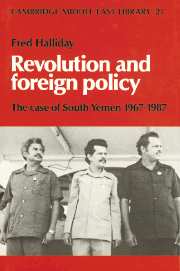Book contents
- Frontmatter
- Contents
- Acknowledgements
- List of abbreviations
- Note on nomenclature
- Note on transliteration
- Outline Chronology
- Introduction: The foreign relations of South Yemen
- 1 Development of foreign policy: through the first decade
- 2 The Yemeni Socialist Party: ‘normalisation’ and factional conflict
- 3 The advanced capitalist countries
- 4 The enigmas of Yemeni ‘unity’
- 5 Regional orientations: ‘solidarity’ and accommodation
- 6 In search of allies: the USSR and China
- Conclusions: revolution and foreign policy
- Appendices
- Notes
- Bibliography
- Index
- Cambridge Middle East Library
1 - Development of foreign policy: through the first decade
Published online by Cambridge University Press: 06 July 2010
- Frontmatter
- Contents
- Acknowledgements
- List of abbreviations
- Note on nomenclature
- Note on transliteration
- Outline Chronology
- Introduction: The foreign relations of South Yemen
- 1 Development of foreign policy: through the first decade
- 2 The Yemeni Socialist Party: ‘normalisation’ and factional conflict
- 3 The advanced capitalist countries
- 4 The enigmas of Yemeni ‘unity’
- 5 Regional orientations: ‘solidarity’ and accommodation
- 6 In search of allies: the USSR and China
- Conclusions: revolution and foreign policy
- Appendices
- Notes
- Bibliography
- Index
- Cambridge Middle East Library
Summary
A revolutionary decolonisation
On 30 November 1967 British rule in South Arabia ended, and a new independent state, the People's Republic of South Yemen, came into existence. The termination of British authority had been preceded by negotiations between the United Kingdom and the guerrilla group that now assumed power, the National Liberation Front, and, at the moment of independence, Britain recognised the new state and offered it some economic aid. Nevertheless, the transition from colonial rule to independence in South Arabia was, by the norms of decolonisation in most British colonies, an exceptional one. It had been preceded by a four-year period of guerrilla war against British rule and that of the British-supported Federation of South Arabia, as well as by fighting between the rival nationalist groups, the NLF and FLOSY. It had culminated in a revolutionary uprising against the established rulers of the hinterland. Public contact between the Front and the UK authorities had begun only three weeks before independence itself.
In condensed form, it can be said that four major factors had contributed to this outcome in the South Arabian arena. First, following the British occupation of Aden in 1839, the colonial power had, during the late nineteenth and twentieth centuries, established control of a fragmented territory and created a new administrative entity, South Arabia. It had later sought to establish there a unified governmental structure, the Federation of South Arabia. The tensions involved in building this state, and the several changes in British policy, had occasioned uncertainty and considerable opposition amongst the local population.
Information
- Type
- Chapter
- Information
- Revolution and Foreign PolicyThe Case of South Yemen, 1967–1987, pp. 8 - 33Publisher: Cambridge University PressPrint publication year: 1990
